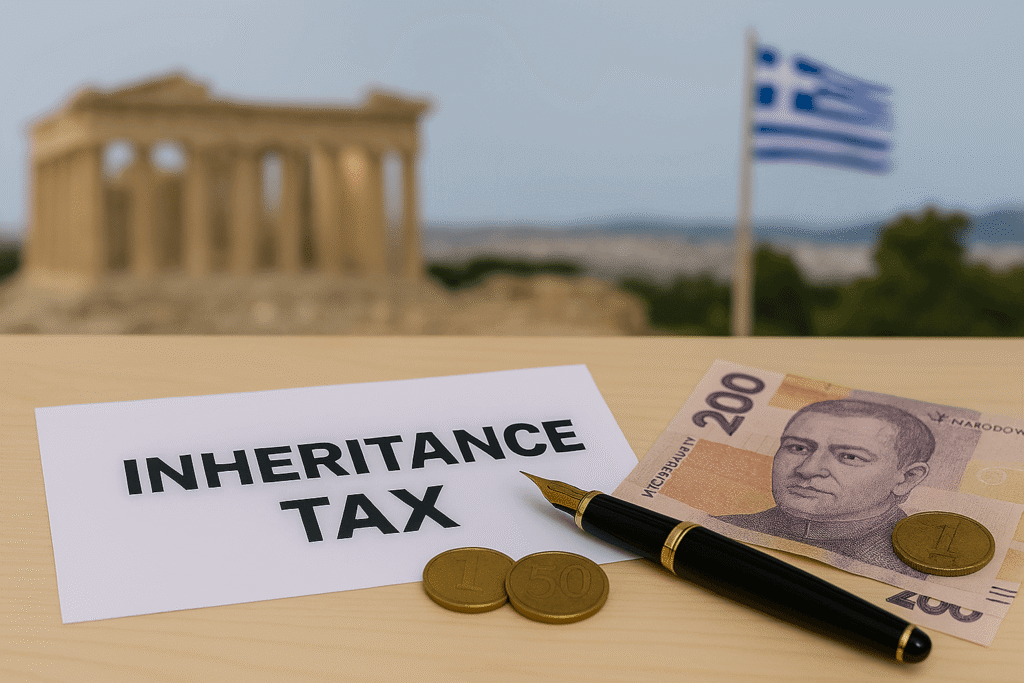If you own assets in Ireland (Dublin, Cork, etc.) or are expected to inherit assets in this country, it’s important to understand the legal and tax implications involved in the inheritance process.
In Ireland, there are rules for taxing inheritances. Reference to tax rates. Early understanding of local law and early planning of wills, residency, and gifts during lifetime can significantly reduce exposure to tax payments when transferring assets between generations.
Beyond that, inheritance tax planning can prevent legal disputes, delays in the inheritance process, and unexpected demands from various authorities.
What’s the Difference Between Tax and Estate Tax?
- Estate Tax – Imposed on the deceased’s assets before they are transferred to the heirs.
- Inheritance Tax – Applies to all assets received by the heir.
Inheritance Tax in Ireland – What You Need to Know?
In Ireland, inheritance tax is called Capital Acquisitions Tax (CAT). is charged at 33% on inheritances that exceed specific tax-free thresholds, which vary depending on the relationship between the beneficiary and the deceased. CAT is imposed on both gifts and inheritances, with both being taxed in the same manner. The amount of CAT is determined according to the market value or a professional valuation of the property, and the tax is payable by the recipient of the gift or inheritance.
CAT applies in the following situations:
- The heir or recipient is resident or ordinarily resident in Ireland;
- The testator or donor is, or was at the time of death, resident or ordinarily resident in Ireland;
- The property is located in Ireland.
This means that even assets located outside Ireland may be subject to CAT if either the giver or the recipient is resident or ordinarily resident in Ireland. However, if both the deceased and the beneficiary are non-residents and the property is situated outside Ireland, CAT does not apply.
Exemptions and Relief
There are several situations in which individuals may be exempt from CAT, including:
- Inheritance received from spouse or civil partner.
- Inheritance of a dwelling house: The exemption applies if the beneficiary lived in the house as their main residence for at least three years before inheriting, owns no other dwelling, and continues to live there for six years after the inheritance. Additionally, the deceased must have used the house as their main residence, unless exceptions apply due to ill health or dependency.
- Gifts with a value of €3,000 or less from any person in any one calendar year are exempt from CAT.
Tax-Free Threshold Amounts by Family Relationship
The relationship between the deceased and the beneficiary does not affect the flat 33% CAT rate; everyone pays this rate once the relevant threshold is exceeded. However, the tax-free threshold amount varies depending on your relationship to the person providing the inheritance.
- Group A: 400,000 euros.
- Group B: 40,000 euros.
- Group C: 20,000 euros.
Group A: Children (including adopted children, children of a spouse or civil partner, minor children of a deceased child, and foster children in certain cases), as well as parents who inherit a full (unconditional) share of their child’s estate.
Group B: Parents (in the case of a gift or a limited share), siblings, nephews and nieces, grandchildren (not included in Group A), grandparents, and certain relatives of foster or adopted children.
Group C: All other relatives and individuals not included in Groups A or B, such as uncles, aunts, cousins, in-laws, friends, and others.
Inheritance Taxation in Israel Compared to Ireland
In Israel, unlike Ireland, there is no estate tax or inheritance tax. However, in certain cases, tax may be imposed on the full value of the inheritance received, such as capital gains tax when selling the asset.
The tax treaty between Israel and Ireland (if it exists) includes provisions that can prevent double taxation. Still, it’s important to plan the reporting and filing accurately to avoid double payment.
To read the Israel-Ireland Tax Treaty in English on the Ministry of Finance website, click here.
Making a Will in Ireland – The Key to Tax Savings and Dispute Prevention
Inheritance doesn’t always transfer smoothly to the heirs. Sometimes complex procedural steps are needed to obtain a probate order or permission to realize the assets.
Creating an organized will is not just a matter of personal desire; it is an integral part of estate taxation. A detailed will can ensure that assets are transferred smoothly and efficiently to the heirs. The will should include the wishes of the deceased but must also be adapted to the requirements of the law so that its validity is not compromised.
At the stage of drafting a will, in many cases, it is possible to choose the law that will apply to it. This choice can have a substantial impact on inheritance planning and its future realization.
Ireland does not have strict forced heirship laws like some European countries, but the surviving spouse has a legal right to a share of the estate. If there are no children, the spouse is entitled to half. If there are children, the spouse gets one-third, no matter what the will says. Children have no automatic right to inherit, but they can challenge a will if they believe they were not properly provided for.
Without advance planning, meaning inheritance without a will, the implication is that the law that will apply to the deceased’s assets will be the law of the deceased’s last and primary place of residence. This means that if, for example, their last place of residence was in Ireland, local law will apply to their inheritance and will determine the distribution among legal heirs, with preference given to the spouse and children.
If you own assets in Ireland, our recommendation is to make a will to ensure that the transfer of assets is done as smoothly as possible. A will can prevent misunderstandings or lengthy legal processes and ensure that the process proceeds in an orderly manner even after the death of the deceased.
Received an Inheritance in Ireland? Number of Steps for Proper Realization of Inheritance from Ireland
1. Clarification of Factual and Legal Background
First, check the type of asset that is to be inherited, its location, the identity and status of the heirs, the value of the asset, and more.
2. Checking the Timing and Location of Inheritance Realization
Consider whether it’s advisable to realize the asset now, and if so, where is it better to realize it – in Ireland or Israel?
3. Regulatory and Banking Aspects
It is recommended to check the costs of money transfers, whether there is a need to open an account in Ireland or another country to transfer funds, what approvals are required, etc.
4. Planning the Asset Transfer
Consider whether to transfer the asset itself or its proceeds, and what the implications are in terms of tax, exemptions, deductions, etc.
5. Avoiding Double Taxation
In light of the existence of the double taxation prevention treaty, it is recommended to check whether there is a mechanism for crediting tax paid in Ireland against tax liability in Israel. Make sure that the reporting is done correctly and accurately to avoid double payment.
6. Checking the Future Effects on the Asset
It is recommended to examine the future effects on the asset, for example, a future sale of the asset will often be subject to capital gains tax in Israel as well.
7. Transferring the Asset to Israel
Performing all necessary actions, submitting documents, handling matters with banks in Ireland and Israel, and executing the asset transfer.
How Can We Help?
The goal is to transfer the inheritance to heirs in Israel in the most tax-efficient way, while addressing legal issues in Israel and Ireland and issues related to banking and regulation. For example, whether it’s better to realize a certain asset in Ireland or transfer it to Israel; how to transfer inheritance funds to a bank account in Israel; how to use various exemptions between heirs; whether to give gifts during lifetime; whether to establish a trust, and more. Strategic planning, according to law and tax treaties, is essential to minimize tax liabilities.
Nimrod Yaron & Co. has extensive experience in personally and professionally accompanying Israelis with assets or inheritances in many countries around the world, including Ireland, from the first stage of planning, through dealing with authorities in Ireland and Israel, to transferring inheritance funds to the heir’s bank account.
We work with all relevant professional entities in Ireland and Israel and offer legal solutions both in terms of taxation and banking, tailored to the circumstances of the case.
If you have inherited an asset or wish to bequeath assets in Ireland in the future, our team of lawyers specializing in international taxation and inheritance law will be happy to advise you on this matter – contact us for an initial consultation.
Q&A
Do I need to pay tax in Israel on an asset inherited from Ireland?
No. There is no inheritance tax in Israel. However, capital gains tax may apply after the sale of the property. It is important to check the recommended date for selling the inherited property.
Why is it important to plan the transfer of assets between generations in advance?
The transfer of assets between generations from abroad is not just a family matter but also a tax and economic issue. Early planning, considering legal issues in Israel and abroad, can save a lot of money and prevent legal complications.
How can the inheritance be realized optimally and save tax?
To realize the inheritance optimally and save unnecessary tax payments, all tax options should be examined, including utilizing exemptions, planning gifts, establishing companies, trust funds, and more.
How can the inheritance tax liability in Ireland be reduced?
Through early tax planning, which includes drafting a will, utilizing exemptions, giving gifts during your lifetime, and more, you can significantly reduce your tax liability.
Is it better to give an asset as a gift during lifetime or to bequeath it?
The choice between giving a gift and bequeathing depends on the circumstances of the case. Sometimes a gift will be taxed similarly to an inheritance. Therefore, the legal and tax aspects should be examined before making a decision.
What are the implications in case there is no will?
In the absence of a will, the inheritance will be divided among the legal heirs according to the local inheritance law of Ireland.
What documents are required for the process of realizing an inheritance in Ireland?
To realize an inheritance in Ireland, documents such as a death certificate, a will (if one exists), copies of the heirs’ ID cards, property ownership documents, bank account confirmations, and more are required.
How long does the process of realizing an inheritance in Ireland take?
It should be considered that the process of realizing an inheritance in Ireland can take between several months and a year or more, depending on the complexity of the testator’s estate, the number of heirs, the existence of a will, and other factors.









